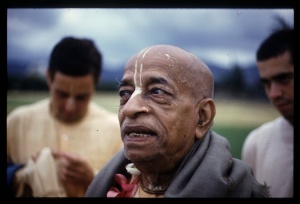SB 3.25.15: Difference between revisions
m (1 revision(s)) |
(Vanibot #0054 edit - transform synonyms into clickable links, which search similar occurrences) |
||
| (One intermediate revision by one other user not shown) | |||
| Line 1: | Line 1: | ||
{{info | {{info | ||
|speaker=Lord Kapiladeva the Supreme Personaliy of Godhead | |speaker=Lord Kapiladeva the Supreme Personaliy of Godhead | ||
|listener=Devahūti, mother of Lord Kapiladeva | |listener=Devahūti, mother of Lord Kapiladeva | ||
}} | }} | ||
[[Category:Srimad-Bhagavatam - Canto 03 Chapter 25]] | |||
[[Category:Bhagavatam Verses Spoken by Lord Kapila - Vanisource|032515]] | |||
<div style="float:left">'''[[Srimad-Bhagavatam]] - [[SB 3|Third Canto]] - [[SB 3.25: The Glories of Devotional Service|Chapter 25: The Glories of Devotional Service]]'''</div> | |||
<div style="float:right">[[File:Go-previous.png|link=SB 3.25.14]] '''[[SB 3.25.14]] - [[SB 3.25.16]]''' [[File:Go-next.png|link=SB 3.25.16]]</div> | |||
{{RandomImage}} | |||
==== TEXT 15 ==== | ==== TEXT 15 ==== | ||
<div | <div class="verse"> | ||
cetaḥ khalv asya bandhāya | :cetaḥ khalv asya bandhāya | ||
muktaye cātmano matam | :muktaye cātmano matam | ||
guṇeṣu saktaṁ bandhāya | :guṇeṣu saktaṁ bandhāya | ||
rataṁ vā puṁsi muktaye | :rataṁ vā puṁsi muktaye | ||
</div> | </div> | ||
| Line 16: | Line 22: | ||
==== SYNONYMS ==== | ==== SYNONYMS ==== | ||
<div | <div class="synonyms"> | ||
''[//vanipedia.org/wiki/Special:VaniSearch?s=cetaḥ&tab=syno_o&ds=1 cetaḥ]'' — consciousness; ''[//vanipedia.org/wiki/Special:VaniSearch?s=khalu&tab=syno_o&ds=1 khalu]'' — indeed; ''[//vanipedia.org/wiki/Special:VaniSearch?s=asya&tab=syno_o&ds=1 asya]'' — of him; ''[//vanipedia.org/wiki/Special:VaniSearch?s=bandhāya&tab=syno_o&ds=1 bandhāya]'' — for bondage; ''[//vanipedia.org/wiki/Special:VaniSearch?s=muktaye&tab=syno_o&ds=1 muktaye]'' — for liberation; ''[//vanipedia.org/wiki/Special:VaniSearch?s=ca&tab=syno_o&ds=1 ca]'' — and; ''[//vanipedia.org/wiki/Special:VaniSearch?s=ātmanaḥ&tab=syno_o&ds=1 ātmanaḥ]'' — of the living entity; ''[//vanipedia.org/wiki/Special:VaniSearch?s=matam&tab=syno_o&ds=1 matam]'' — is considered; ''[//vanipedia.org/wiki/Special:VaniSearch?s=guṇeṣu&tab=syno_o&ds=1 guṇeṣu]'' — in the three modes of nature; ''[//vanipedia.org/wiki/Special:VaniSearch?s=saktam&tab=syno_o&ds=1 saktam]'' — attracted; ''[//vanipedia.org/wiki/Special:VaniSearch?s=bandhāya&tab=syno_o&ds=1 bandhāya]'' — for conditional life; ''[//vanipedia.org/wiki/Special:VaniSearch?s=ratam&tab=syno_o&ds=1 ratam]'' — attached; ''[//vanipedia.org/wiki/Special:VaniSearch?s=vā&tab=syno_o&ds=1 vā]'' — or; ''[//vanipedia.org/wiki/Special:VaniSearch?s=puṁsi&tab=syno_o&ds=1 puṁsi]'' — in the Supreme Personality of Godhead; ''[//vanipedia.org/wiki/Special:VaniSearch?s=muktaye&tab=syno_o&ds=1 muktaye]'' — for liberation. | |||
</div> | </div> | ||
| Line 23: | Line 29: | ||
==== TRANSLATION ==== | ==== TRANSLATION ==== | ||
<div | <div class="translation"> | ||
The stage in which the consciousness of the living entity is attracted by the three modes of material nature is called conditional life. But when that same consciousness is attached to the Supreme Personality of Godhead, one is situated in the consciousness of liberation. | The stage in which the consciousness of the living entity is attracted by the three modes of material nature is called conditional life. But when that same consciousness is attached to the Supreme Personality of Godhead, one is situated in the consciousness of liberation. | ||
</div> | </div> | ||
| Line 30: | Line 36: | ||
==== PURPORT ==== | ==== PURPORT ==== | ||
<div | <div class="purport"> | ||
Teachings of Lord Kapila, the Son of Devahūti, | [[TLK 9 Purifying the Mind for Self-realization#TEXT 15|Teachings of Lord Kapila, the Son of Devahūti, Text 15]] | ||
There is a distinction here between Kṛṣṇa consciousness and māyā consciousness. Guṇeṣu, or māyā consciousness, involves attachment to the three material modes of nature, under which one works sometimes in goodness and knowledge, sometimes in passion and sometimes in ignorance. These different qualitative activities, with the central attachment for material enjoyment, are the cause of one's conditional life. When the same cetaḥ, or consciousness, is transferred to the Supreme Personality of Godhead, Kṛṣṇa, or when one becomes Kṛṣṇa conscious, he is on the path of liberation. | |||
There is a distinction here between Kṛṣṇa consciousness and ''māyā'' consciousness. ''Guṇeṣu'', or ''māyā'' consciousness, involves attachment to the three material modes of nature, under which one works sometimes in goodness and knowledge, sometimes in passion and sometimes in ignorance. These different qualitative activities, with the central attachment for material enjoyment, are the cause of one's conditional life. When the same ''cetaḥ'', or consciousness, is transferred to the Supreme Personality of Godhead, Kṛṣṇa, or when one becomes Kṛṣṇa conscious, he is on the path of liberation. | |||
</div> | </div> | ||
__NOTOC__ | |||
<div style="float:right; clear:both;">[[File:Go-previous.png|link=SB 3.25.14]] '''[[SB 3.25.14]] - [[SB 3.25.16]]''' [[File:Go-next.png|link=SB 3.25.16]]</div> | |||
__NOTOC__ | |||
__NOEDITSECTION__ | |||
Latest revision as of 21:46, 17 February 2024

A.C. Bhaktivedanta Swami Prabhupada
TEXT 15
- cetaḥ khalv asya bandhāya
- muktaye cātmano matam
- guṇeṣu saktaṁ bandhāya
- rataṁ vā puṁsi muktaye
SYNONYMS
cetaḥ — consciousness; khalu — indeed; asya — of him; bandhāya — for bondage; muktaye — for liberation; ca — and; ātmanaḥ — of the living entity; matam — is considered; guṇeṣu — in the three modes of nature; saktam — attracted; bandhāya — for conditional life; ratam — attached; vā — or; puṁsi — in the Supreme Personality of Godhead; muktaye — for liberation.
TRANSLATION
The stage in which the consciousness of the living entity is attracted by the three modes of material nature is called conditional life. But when that same consciousness is attached to the Supreme Personality of Godhead, one is situated in the consciousness of liberation.
PURPORT
Teachings of Lord Kapila, the Son of Devahūti, Text 15
There is a distinction here between Kṛṣṇa consciousness and māyā consciousness. Guṇeṣu, or māyā consciousness, involves attachment to the three material modes of nature, under which one works sometimes in goodness and knowledge, sometimes in passion and sometimes in ignorance. These different qualitative activities, with the central attachment for material enjoyment, are the cause of one's conditional life. When the same cetaḥ, or consciousness, is transferred to the Supreme Personality of Godhead, Kṛṣṇa, or when one becomes Kṛṣṇa conscious, he is on the path of liberation.